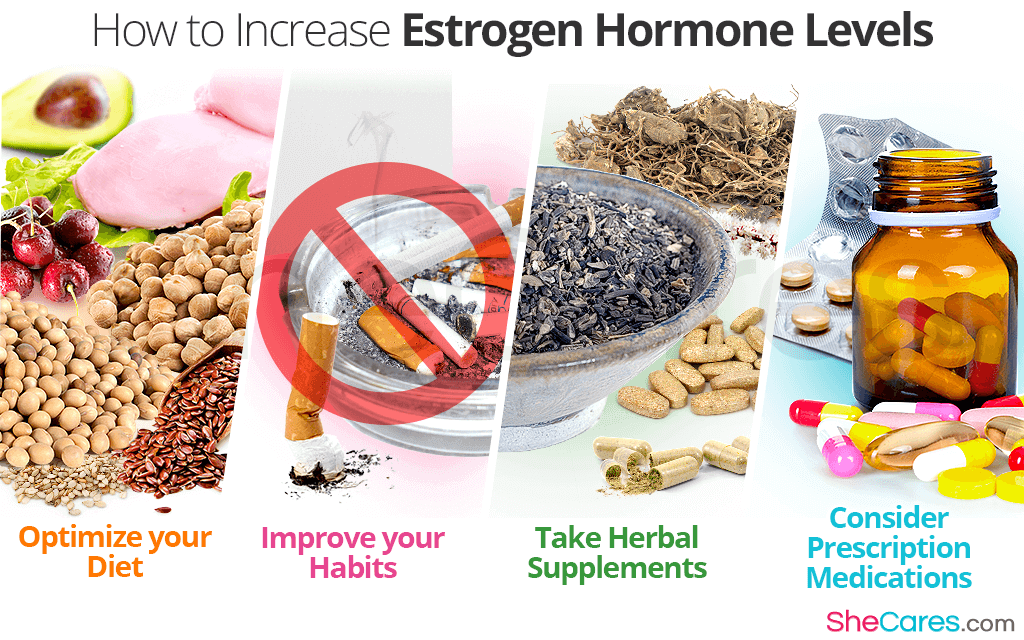Women suffering from symptoms of low estrogen are typically desperately searching for ways to effectively increase its levels and find lasting relief. Luckily, women do not have to endure hormonal imbalance forever as healthy estrogen levels can be achieved with a handful of simple steps.
Continue reading to learn how to increase estrogen levels with diet, wholesome habits, herbal supplements, and medications for a symptom-free life in no time!
Optimize your Diet
Since “we are what we eat,” consuming a nutritious and well-balanced diet can be the first step towards increasing estrogen levels naturally and risk-free. The best options include foods rich in phytoestrogens, weak plant-based estrogen-like compounds that mimic estrogen in the body, thus contributing to its balance.1
Find them in flax, soy, chickpeas, sesame, cherries, and others. Complementing phytoestrogenic foods with lean protein, complex carbs, and healthy fats is key to obtaining best results.
Improve your Habits
Quitting smoking is another good approach to boosting estrogen levels. Studies have shown that smoking increases the risk of hormonal imbalance, including lower estrogen and higher testosterone levels in women who are smokers than those who do not smoke.2,3,4
Also, moderating daily coffee intake can also be beneficial as caffeine has been found to have varying effects on estrogen levels in women of various races and at different reproductive stages.5
Take Herbal Supplements
Besides a wholesome lifestyle, the answer to how to increase estrogen hormone levels often lies in alternative medicine.6 While phytoestrogenic supplements, such as black cohosh, contain higher concentrations of phytoestrogens that work to fill in the hormonal gap, their long-term use is not recommended.
Hormone-regulating supplements like Macafem, on other hand, stimulate the endocrine glands to boost their own hormonal production, thus increasing estrogen levels safely and naturally.
Consider Prescription Medications
While pharmacological solutions to how to increase estrogen levels are usually left until the last resort due to potentially dangerous side effects, some women with estrogen deficiency might need them to achieve hormonal balance.
For menopausal women, the most common - though risky - treatment method is hormone replacement therapy (HRT), whereas women at other life stages might benefit from birth control pills.
Conclusions
The key answer to how to increase estrogen levels is to act fast so that a temporary imbalance does not go untreated for a long time and transform into a significant and long-term estrogen deficiency. Women passing through the menopausal transition are at an especially high risk of complications that consistently low estrogen levels might ensue. As such, making a prompt and thorough action plan is key. Read more about balancing hormones naturally by clicking on the preceding link and achieve hormonal balance now and forever!
Sources
- Cytotechnology. (2014). Osteoprotective effect of soybean and sesame oils in ovariectomized rats via estrogen-like mechanism. Retrieved November 11, 2019 from https://www.ncbi.nlm.nih.gov/pmc/articles/PMC3918270/
- JAMA. (2010). Soy Food Intake and Breast Cancer Survival. Retrieved November 11, 2019 from https://www.ncbi.nlm.nih.gov/pmc/articles/PMC2874068/
- Toxicology research. (2017). Modulation of estrogen synthesis and metabolism by phytoestrogen in vitro and the implications for women's health. Retrieved November 11, 2019 from https://www.ncbi.nlm.nih.gov/pubmed/30090542
Footnotes:
- Frontiers in Neuroendocrinology. (2010). The pros and cons of phytoestrogens. Retrieved November 11, 2019 from https://www.ncbi.nlm.nih.gov/pmc/articles/PMC3074428/
- American Public Health Association. (2009). Smoking Affects Women's Sex Hormone-Regulated Body Form. Retrieved November 11, 2019 from https://www.ncbi.nlm.nih.gov/pmc/articles/PMC2707474/
- Environmental Health Perspectives. (2005). Cigarette Smoking and Effects on Hormone Function in Premenopausal Women. Retrieved November 11, 2019 from https://www.ncbi.nlm.nih.gov/pmc/articles/PMC1281267/
- American Association for Cancer Research. (2013). Urinary Concentrations of Estrogens and Estrogen Metabolites and Smoking in Caucasian Women. Retrieved November 11, 2019 from https://cebp.aacrjournals.org/content/22/1/58
- Cancer Epidemiology, Biomarkers & Prevention. (2016). Caffeine, coffee and tea intake and urinary estrogens and estrogen metabolites in premenopausal women. Retrieved November 11, 2019 from https://www.ncbi.nlm.nih.gov/pmc/articles/PMC4526325/
- Menopause. (2015). Use and perceived efficacy of complementary and alternative medicines after discontinuation of hormone therapy: a nested United Kingdom Collaborative Trial of Ovarian Cancer Screening cohort study. Retrieved November 11, 2019 from https://www.ncbi.nlm.nih.gov/pmc/articles/PMC4470524/
